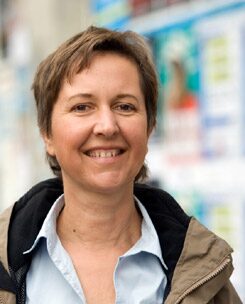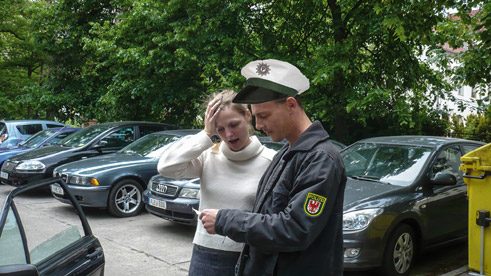Linguistic Variants
“German is Versatile”

How do we assess dialects, youth language, multilingualism and linguistic development? A new portal for further training and teaching launched by the University of Potsdam offers teachers and educators the possibility to test their own attitudes to the various forms of language.
Ms Wiese, in line with its motto “Dialects, Multilingualism and the Question of the ‘Right’ German” the “deutsch-ist-vielseitig.de” (German is Versatile ) portal addresses trainers, teachers and educators. What are you aiming to achieve with it?
In the field of education the focus is firmly on imparting standard German, what the Germans call “Hochdeutsch” (High German). This, however, often obscures the fact that many kindergarten children and pupils in schools have a range of very different skills – outside the realm of standard German. There are traditional dialects, youth languages, urban dialects, text messaging codes and common colloquial speech and they are all part of the German language. This is important to be aware of, if children are to be properly supported and encouraged in the way they use their German. German – like any other language – comes in many variants. From a linguistic point of view the urban dialects, the traditional dialects and the text messaging codes are no better or worse , they are simply used in different contexts. This often leads to children not being appreciated for what they can do outside the realm of standard German and that is why they are often not properly assessed.
Make use of linguistic diversity
The website presents practice-oriented, multimedia materials for both the initial and further training of teachers, not to mention concrete lesson materials. In schools and kindergartens, however, the promotion of standard German is in fact being optimised. How then can teachers and educators, when focusing on standard German, embrace such a thing as linguistic diversity, i.e. dialects, text messaging codes and youth language? Heike Wiese
| © Steffi Loos
By encouraging teachers, for example, to recognise children’s skills and creativity in other linguistic areas and not to write them off as “bad” German. This enables pupils to develop a more positive, linguistic self-image, they feel more accepted and adopt a different approach to the way they participate in lessons. If teachers achieve that, they can make use of linguistic diversity in order to improve the way they teach standard German – maybe by getting the pupils to work out the differences in a playful way between youth language and formal standard German or between spoken and written language. Teachers can promote pupils’ abilities in a much better way, if they have an undistorted view of them. One of the basic prerequisites for this, however, is being aware of one’s own prejudices.
Heike Wiese
| © Steffi Loos
By encouraging teachers, for example, to recognise children’s skills and creativity in other linguistic areas and not to write them off as “bad” German. This enables pupils to develop a more positive, linguistic self-image, they feel more accepted and adopt a different approach to the way they participate in lessons. If teachers achieve that, they can make use of linguistic diversity in order to improve the way they teach standard German – maybe by getting the pupils to work out the differences in a playful way between youth language and formal standard German or between spoken and written language. Teachers can promote pupils’ abilities in a much better way, if they have an undistorted view of them. One of the basic prerequisites for this, however, is being aware of one’s own prejudices.Is that why a whole module is devoted to prejudices in the way speakers are perceived?
Yes, it is so often the case that our own prejudices often obstruct our view of a pupil’s potential and skills. This can be put down to the fact that certain languages have a particular “market value”. When a child speaks French at home, because his parents, for example, come from France, it is of course acknowledged as an additional linguistic skill. Whereas, on the other hand, when a child speaks Turkish at home, it is not always viewed the same way. This is often seen as a handicap and the additional linguistic skills that the child acquires are not acknowledged at all. The prejudices we have and the stereotypes in our minds influence our perception and even our memory. In the module you mentioned there is a video clip that allows teachers to experience how memories can play tricks on us and, for example, how a pupil’s assessment can be negatively affected, if he pronounces the German word for “I” as “isch” and not “ich” or if he switches between German and Turkish when he is talking to friends.
What language should be used in different situations?
 Practicing linguistic register skills
| © deutsch-ist-vielseitig.de
In the module entitled “Linguistic Usage“ the focus is on the linguistic “repertoire” of the speakers. One of the module’s units shows, for example, with the aid of photos and quote cards, how a bicycle accident is described by the same person but in various linguistic ways – depending on whether a friend is being spoken to, a teacher or the police; or depending on whether a report is being written or a text message is being compiled. Another example is a phone call for a visit to the cinema.
Practicing linguistic register skills
| © deutsch-ist-vielseitig.de
In the module entitled “Linguistic Usage“ the focus is on the linguistic “repertoire” of the speakers. One of the module’s units shows, for example, with the aid of photos and quote cards, how a bicycle accident is described by the same person but in various linguistic ways – depending on whether a friend is being spoken to, a teacher or the police; or depending on whether a report is being written or a text message is being compiled. Another example is a phone call for a visit to the cinema.This is good way of practicing what is known in curicula as linguistic register skills. What does it mean when pupils speak urban or regional dialects or youth languages in the playground? Does it mean they are not capable of speaking standard German? Of course not, it is in no way an indication of their standard German skills. Pupils communicate with each other in a different way than they would in a formal situation. The teacher has to be aware of this. It would in fact be a sign of poor linguistic skills, if the pupils could not switch from one linguistic register to another and if they always spoke in the language of formal written German. What teachers should be doing in lessons is support the systematic differentiation of such registers. What language should be used at an interview for a job, in what language should they speak to a friend on their mobile phone, and what are the linguistic differences between the two registers?
Urban dialect: A call to the cinema | © deutsch-ist-vielseitig.de
Urban dialect: A call to a friend | © deutsch-ist-vielseitig.de
Linguistic complexity and difficult grammatical rules are not just to be found in standard German. When a Berliner says, “Das ist meiner Mutter ihr Hut“ (literally: “That is of my mother her hat”, dialectical) he uses more complex rules than when he says “Das ist der Hut meiner Mutter“ (“That is my mother’s hat”, standard German). It is important to note - people who speak a dialect do not do it because they are “too stupid or lazy to speak properly”. In dialects, too, things can be “right” and “wrong” and there are also grammar rules.
You emphasise the equal value of different linguistic variants. Is this not going to downgrade standard German a little?
From a linguistic point of view standard German is no better or worse than other linguistic variants. From the point of view of social standing, however, standard German still enjoys the most prestige. It is the way the middles classes speak and is mostly considered to be the language of educated people. This is why it is important for pupils to be proficient in standard German and to use it in the appropriate situations.
Since 2006 Prof. Dr. Heike Wiese has been a professor for Contemporary German Language at the Institute for German Language and Literature at the University of Potsdam. Since February 2015 the deutsch-ist-vielseitig.de portal has been posting content and materials from her project Aus- und Fortbildungsmodule zur Sprachvariation im urbanen Raum: Dialekte, Mehrsprachigkeit und die Frage nach dem „richtigen Deutsch“ (Modules on Language Variation for Techers’ Education – Dialects, Multilingualism and the Question of the ‘Correct’ Language)